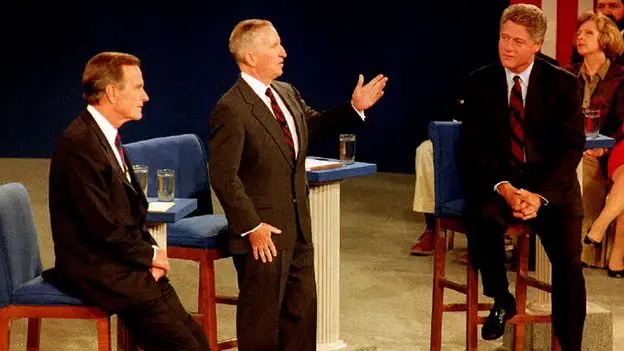If you’re not familiar with this, the general election Presidential debates are organized by the Commission on Presidential Debates. This bi-partisan organization is responsible for securing venues, finding moderators, and setting the rules governing who is allowed to participate in the debate. The participation rules are structured in such a way, with the blessing of the two major parties, that exclude any candidate without a major party backing. After much debate over the debates, a new bi-partisan group is hoping to change these rules to be more accepting of independent and third-party candidates.
Report from Politico:
Nearly 50 prominent former elected and appointed officials from both parties are taking on the Commission on Presidential Debates in an effort to make it easier for independent candidates to get a coveted spot on the national stage in the fall of 2016.
The informal group — which includes former Utah Gov. Jon Huntsman Jr., former CIA director and retired Gen. Michael Hayden, former Sens. Bob Kerrey and Joe Lieberman, former Gov. Christine Todd Whitman and retired Gen. Stanley McChrystal — argue in a letter released Tuesday night that the commission makes it nearly impossible for a third-party candidate to get invited to the presidential debates. And the absence of third-party candidates, they contend, ultimately harms democracy and serves only the interests of the two major parties.
The current set of rules “serves only the interests of the Democratic and Republican parties in maintaining their duopoly,” the group wrote in a letter to the CPD. “We urge you to change the rule now in order to have a new, more democratic 2016 that breaks free of our current tired and failing politics.”
The commission’s current threshold for inclusion requires candidates to get an average of at least 15 percent in the most recent national polls conducted by five selected national public opinion polling organizations. That hurdle makes it difficult for any candidate without major party backing to get into the debates. [Emphasis added]
The group’s so-called Change the Rule campaign proposes a signature competition among independent candidates who can show by April 30 of the election year that they will be on the ballot in enough states to theoretically get the 270 electoral votes necessary to win the presidency. If multiple third-party candidates clear that hurdle, the candidate with the most signatures would get on the debate stage — a winnowing designed to prevent a slew of long-shot candidates from muddying the debates.
The change they’re asking for is simple. If you, as a candidate, are on enough state ballots where your victories could total up to 270 electoral votes, the number needed to win the presidency, then you should be allowed on the debate stage. The polling threshold is a self-fulfilling prophecy. If you’re stuck at five percent in national polls but you’re on every state ballot, being excluded from the debate guarantees you’ll stay at five percent even though you could theoretically win the presidency.
The biggest obstacle here in more inclusive debates is the two-party establishment system. Neither the Democrats nor the Republicans want to risk a third-party, or independent candidate, on the stage challenging the two-party dynamic. For example, see Ross Perot in 1992, which some credit as handing victory to Bill Clinton.
I doubt this new campaign, even with the wide bi-partisan backing, will make an impact, especially not in 2016. Perhaps it will open the debate about the debates for elections down the road, but the major parties will not be open to a free-for-all in an election just nineteen months away.
Donate Now to Support Election Central
- Help defend independent journalism
- Directly support this website and our efforts
